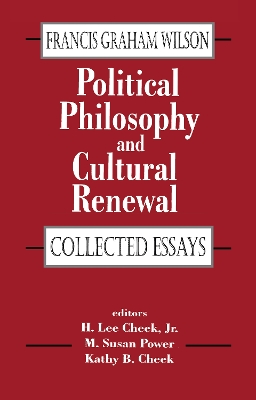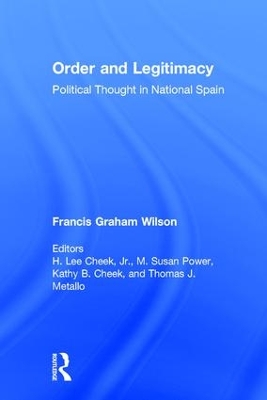Library of Conservative Thought
2 total works
Francis Graham Wilson was a central figure in the revival of interest in political philosophy and American political thought in the mid-twentieth century. While he is best known as a Catholic writer and conservative theorist, his most significant contribution is his original interpretation of the development of American politics. Central to his thought was a process of self-interpretation by the citizenry, a quest for ultimate meaning turning to a divine, transcendent, basis of history and shared experience. Although Wilson's writings were extensive and influential, they have not been readily available for decades.
Political Philosophy and Cultural Renewal brings together a coherent and representative selection of his work, highlighting his concern for the common good and his belief in personal and societal restraint as an alternative to political partisanship and superficiality.Wilson's affirmation of a republican inheritance encourages contemporary students of politics to revisit the Founders' views of diffused political authority. His remarkable contribution to American political philosophy is a full-fledged theory of cultural renewal that has lost none of its relevance for contemporary political and social issues.
This volume will be of interest to historians, political scientists, and American studies specialists.
A growing body of readers is rediscovering Francis Graham Wilson's tremendous contribution to the study of politics and humane learning. In this volume he offers an extensive assessment of the nature of politics and the search for order in Spanish politics, concentrating on the central figures who defended the Church and communities during the Spanish Civil War.
The book argues for the uniqueness of Spain among the other countries of Europe. For Wilson, the most salutary attribute of Spanish politics is found in the assemblage of smaller groupings of the citizenry within the larger society in communities; and it is in the smaller association that the most important aspects of moral, social and political life were nurtured. Part 1 includes assessments of three eminent Spanish traditionalists, Juan Donoso Cortés, Jaime Balmes, and Menéndez Pelayo, as well as studies of central figures from the period of the Spanish Civil War—José Antonio and Ramiro de Maeztu. The final chapters are taken from an unpublished book-length manuscript, "An Anchor in the Latin Mind," that Wilson had completed at the time of his death in 1976, and was recently discovered by the editors.
For Wilson, Latin thinkers possess advantages others do not—a political realism that can be reinvigorated. The recovery of Spanish traditionalism, according to this book, is dependent upon a return to the self-understanding of the ordering principles of Spanish politics and society. Wilson's affirmation of a Spanish traditionalist inheritance during his lifetime encouraged a return to authentic popular rule and a greater appreciation of Spanish achievements in politics and the moral life.

